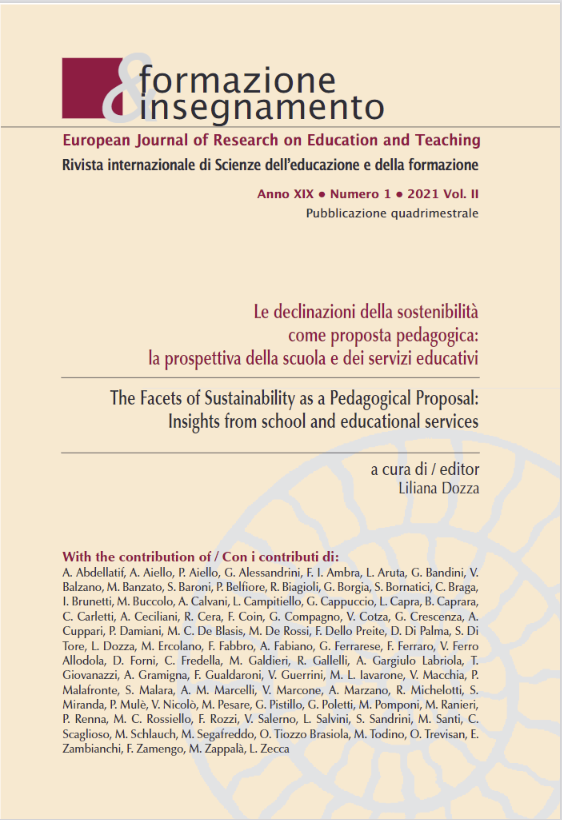Modelling Bottom-up Territorial Development within the Framework of Sustainable Educational Research: A "Multi-Voice" Contribution Concerning Transformative, Innovative, and Participatory Processes Facing Local Sociocultural Demands and Special Needs
DOI:
https://doi.org/10.7346/-fei-XIX-01-21_66Keywords:
Bottom-up processes, Education, Territory, Transformative learning, WelfareAbstract
This paper joins together different educational research approaches, which highlight the relevance of educational research as a stimulus to bottom-up transformative processes, and as a tool to make them valuable at the local (territorial) and global (national, European) level. Each approach is dedicated to a single region or administrative district of Italy, within which their cases unfold (namely: Apulia, Lombardy, and Trento). Moreover, as made apparent by the joint diagram, they all share assumptions with regards to the ontology of the macrolevel, which constitute the bases for their comparability. The final section subsumes individual results by projecting them against a theo-retical background that stresses on the role of bottom-up processes as fos-terers of transformative resilience; the latter allows for adaptation without depletion of contextual elements, nor the avoidance of selective pressures. As such, educational research qualifies as one of the cornerstones of sus-tainable development.
References
Adamski, T., & Gorlach, K. (2007). Neo-Endogenous Development and the Revalidation of Local Kowledge. Polish Sociological Review, 160, 481–497. Retrieved December 10, 2020, from http://www.jstor.org/stable/41275036
Alessandrini, G. (2017). Atlante di Pedagogia del lavoro. Milano (IT): FrancoAngeli.
Bacigalupo, M., Kampylis, P., Punie, Y., & Van den Brande, G. (2016). EntreComp: the entrepreneurship competence framework. Publication Office of the European Union. https://doi.org/10.2791/593884
Balzano, V. (2017). Educazione, persona e welfare: Il contributo della pedagogia nello sviluppo delle politiche sociali. Bari (IT): Progedit.
Balzano, V. (2020a). Educazione e welfare: la persona e la sua identità come antidoto alla deprivazione antropologica dell’era postmoderna. Pedagogia e Vita, 1/2020, pp. 135–149.
Balzano, V. (2020b). Educare alla cittadinanza sociale. Bari (IT): Progedit.
Bove, C. (2009). Ricerca educativa e formazione: Contaminazioni metodologiche. Milano (IT): Franco Angeli.
Calaprice, S. (2016). Paradosso dell’infanzia e dell’adolescenza: attualità, adultità, identità. Per una pedagogia dell’infanzia e dell’adolescenza. Milano (IT): FrancoAngeli.
Cepollaro, G., & Varchetta, G. (2014). La formazione tra realtà e possibilità: I territori della betweenness. Milano (IT): Guerini Next.
Chionna, A. (2007). Pedagogia della dignità umana. Educazione e percorsi del rispetto. Brescia (IT): La Scuola.
Corsi, M. (2014). Come pensare l’educazione. Brescia (IT): La Scuola.
Costa, M. (2016). Capacitare l’innovazione: La formatività dell’agire lavorativo. Milano (IT): FrancoAngeli.
Costa, M., & Morselli, D. (2019). L’imprenditività per lo sviluppo in chiave capacitativa dell’agentività negli adulti. Risultati di un progetto europeo Erasmus Plus / An enterprising capability for the development of agency in adults: results from a European Erasmus Plus project. Pedagogia Oggi, 17(2), pp. 168–183. https://doi.org/10.7346/PO-022019-11
Council of the European Union. (2018). Council recommendation of 22 May 2018 on key competences for lifelong learning (text with EEA relevance). Official Journal of the European Union, 2018/C 189/01, 1–13. https://eur-lex.europa.eu/legal-content/EN/TXT/?uri=uriserv:OJ.C_.2018.189.01.0001.01.ENG
De Martino, V., Cutillo, A. (2020). Le statistiche dell’istat sulla povertà – anno 2019. Retrieved December 10, 2020, from https://web.archive.org/web/20201111113503/https://www.istat.it/it/files/2020/06/REPORT_POVERTA_2019.pdf
De Rubertis, S. (2013). Identità territoriale e progetti di sviluppo: Un punto di vista cibernetico. In T. Barini (Ed.), Identità territoriali: Questioni, metodi, esperienze a confronto (pp. 29–44). Milano (IT): Franco Angeli.
Dematteis, G., & Magnaghi, A. (2018). Patrimonio territoriale e coralità produttiva: nuove frontiere per i sistemi economici locali. Scienze del territorio, 6, 12–25. https://doi.org/10.13128/Scienze_Territorio-24362
Elia, G. (2016). Prospettive di ricerca pedagogica. Bari (IT): Progedit.
Ellerani, P. (2015). Intercultura e cittadinanza. Nuove prospettive per la ricerca pedagogica. Milano (IT): Mondadori.
Ellerani, P. (2017). Costruire l’ambiente di apprendimento. Prospettive di cooperative learning, service learning e problem-based learning. Teramo (IT): Lisciani Scuola.
Ellerani, P., & Colazzo, S. (Eds.). (2018). Service Learning: Tra Didattica e Terza Missione. Ripensare e Riprogettare l’Organizzazione nelle Scuole e nelle Università. Lecce (IT): Università del Salento.
Fiorin, I. (Ed.). (2015). Oltre l’aula. La proposta pedagogica del service learning. Milano (IT): Mondadori Education.
Formenti, L. (2017). Formazione e trasformazione: Un modello complesso. Milano (IT): Raffaello Cortina Editore.
Formenti, L. (2018). Modelli contestuali e sistemi complessi nella ricerca in EDA. In P. Federighi (Ed.), Educazione in età adulta: ricerche, politiche, luoghi e professioni. Firenze (IT): Firenze University Press.
Gherardi, S., Houtbeckers, A., Jalonen, A., Kallio, G., Katila, S., & Laine, P. M. (2016). A collective dialogical inquiry into post-qualitative methodologies. NSA Conference (Helsinki, 11–13 august 2016).
ASviS (2020). Politiche per fronteggiare la crisi da COVID-19 e realizzare l’Agenda 2030 per lo sviluppo sostenibile. Alleanza Italiana per lo Sviluppo Sostenibile. Retrieved December 10, 2020, from https://asvis.it/public/asvis2/files/Pubblicazioni/RapportoASviSCovidAgenda2030.pdf
Iori, V. (2018). Educatori e pedagogisti. Senso dell’agire educativo e riconoscimento professionale. Trento (IT): Erickson.
Jonas, H. (1990). Il principio di responsabilità: Un’etica per la civiltà tecnologica. Torino (IT): Einaudi.
Jones, B., & Iredale, N. (2010). Enterprise education as pedagogy. Education + Training, 52(1), 7–19. https://doi.org/10.1108/00400911011017654
Marcelli, A. M. (2020). Greater Humanities for Education. Formazione & insegnamento, 18(1), 144–156. https://doi.org/10.7346/-fei-XVIII-01-20_13
Margiotta, U. (2015). Teoria della formazione: Nuovi orizzonti della pedagogia. Roma (IT): Carocci.
Marshall, T. H. (1964). Class, Citizenship and Social Development. New York (NY, USA): Doubleday.
Mezirow, J. (1991). Transformative dimensions of adult learning. San Francisco (CA, USA): Jossey-Bass.
MIUR (2018). Promozione di un percorso di Educazione all’imprenditorialità nelle scuole di II grado Statali e Paritarie in Italia e all’estero. Curriculum imprenditoriale. Sillabo. Retrieved December 10, 2020, from https://www.miur.gov.it/-/promozione-di-un-percorso-di-educazione-all-imprenditorialita-nelle-scuole-di-ii-grado-statali-e-paritariein-italia-e-all-estero
Morselli, D. (2016). La pedagogia dell’imprenditività nell’educazione secondaria / Educating for enterprise in secondary education. Formazione & insegnamento, 14(2), S173–S185. Retrieved December 10, 2020, from https://ojs.pensamultimedia.it/index.php/siref/article/view/1992
Morselli, D. (2019). The change laboratory for teacher training in entrepreneurship education: A new skills agenda for Europe. Cham (CH): Springer. https://doi.org/10.1007/978-3-030-02571-7
Mortari, L. (Ed.). (2017a). Service Learning: Per un apprendimento responsabile. Milano (IT): FrancoAngeli.
Mortari, L. (2017b). Costruire insieme un bene comune. In L. Mortari (Ed.), Service Learning: Per un apprendimento responsabile. Milano (IT): FrancoAngeli.
Downloads
Published
How to Cite
Issue
Section
License
Copyright (c) 2021 Pensa MultiMedia

This work is licensed under a Creative Commons Attribution 4.0 International License.
Formazione & insegnamento is distributed under Attribution 4.0 International (CC BY 4.0).
For further details, please refer to our Repository & Archiving Policy, as well as our Copyright & Licensing Terms.





